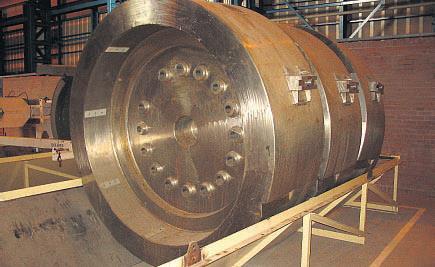Sellafield Ltd has sent six unwanted shock absorbers from fuel transport flasks to a local scrap merchant to be recycled into the metals market, having proved them to be exempt from treatment as nuclear waste.
 |
| Waste not, want not - one of the redundant shock absorbers (Image: Sellafield Ltd) |
The redundant shock absorbers are currently stored in the Oxide Flask Maintenance facility at Sellafield. Had they been required to be treated as nuclear waste, their storage and disposal would have cost a considerable amount of money and taken up valuable storage space. Now Sellafield can make money from selling the steel from the scrapped parts.
Alan Black, technical manager of Sellafield's Waste business unit said, "We've carried out detailed assessments in a joint venture between several teams including Metals Recycling Facility, Waste Technical, Clearance and Characterization, Oxide Flask Maintenance and Disposals to prove the shock absorbers can be monitored for exemption and sent off site as free-release material."
"This was done using strict bulk exemption procedures piloted in this plant - the first major production plant in the country to work to the Nuclear Industry Code of Practice for exemption," added Gareth Kendall, delivery manager of the Metals Recycling Facility.
Sellafield Ltd said that there will be some 100 redundant transport flasks over the next ten years or so. At the current market price of some £2000 ($3250) per tonne of steel sold, the company could make around £900,000 ($1.5 million) from selling the steel from shock absorbers.




_47120.jpg)

_23621.jpg)






